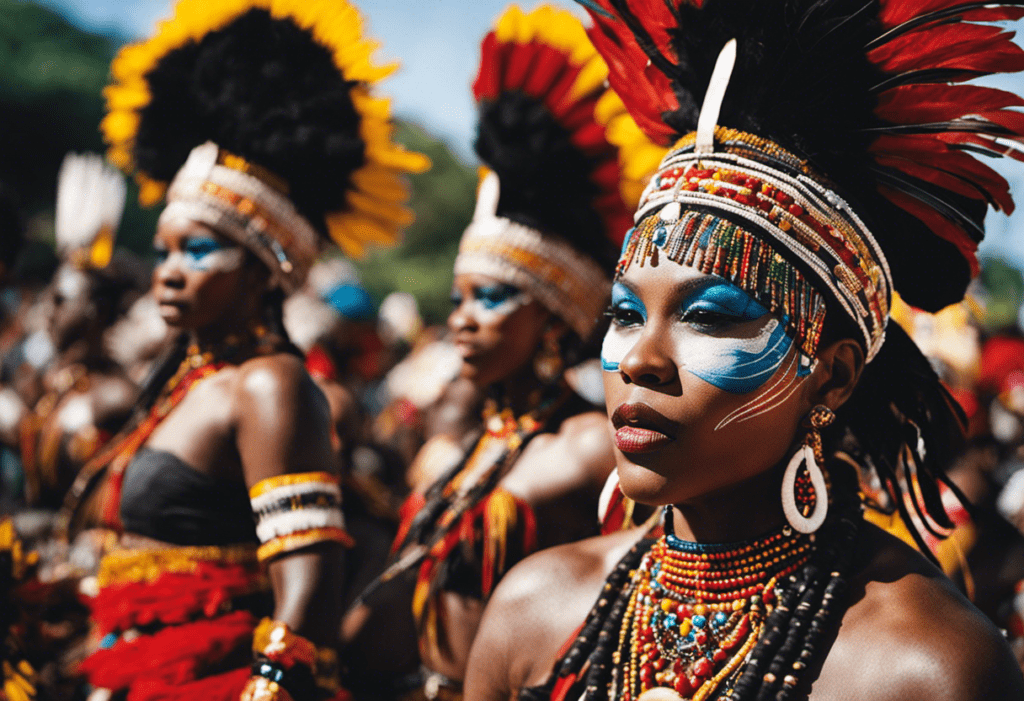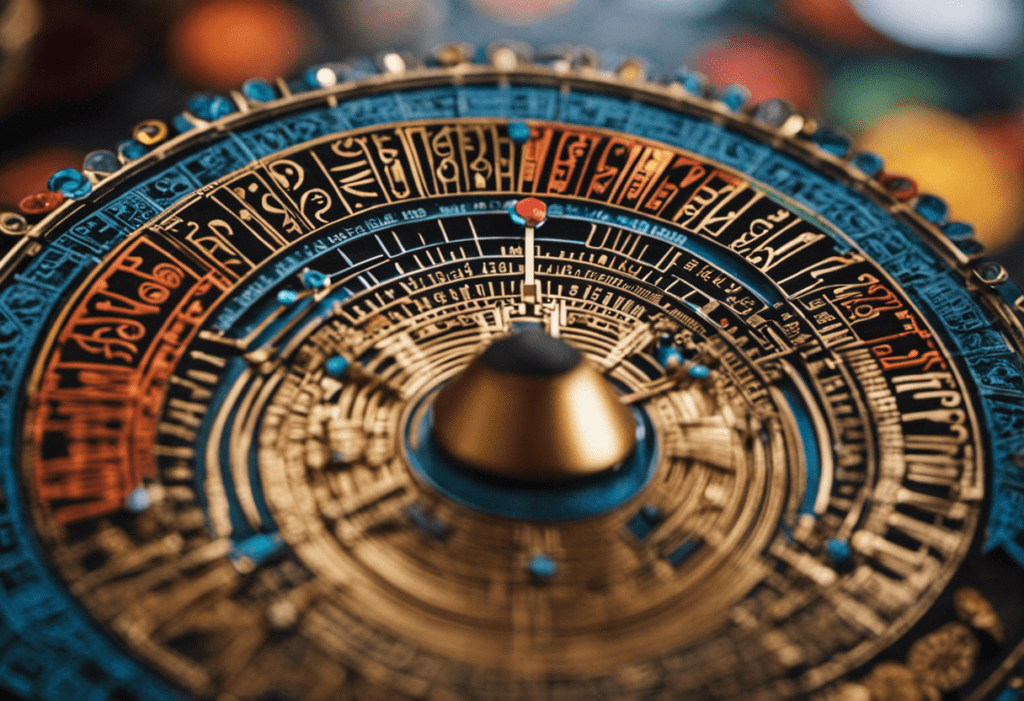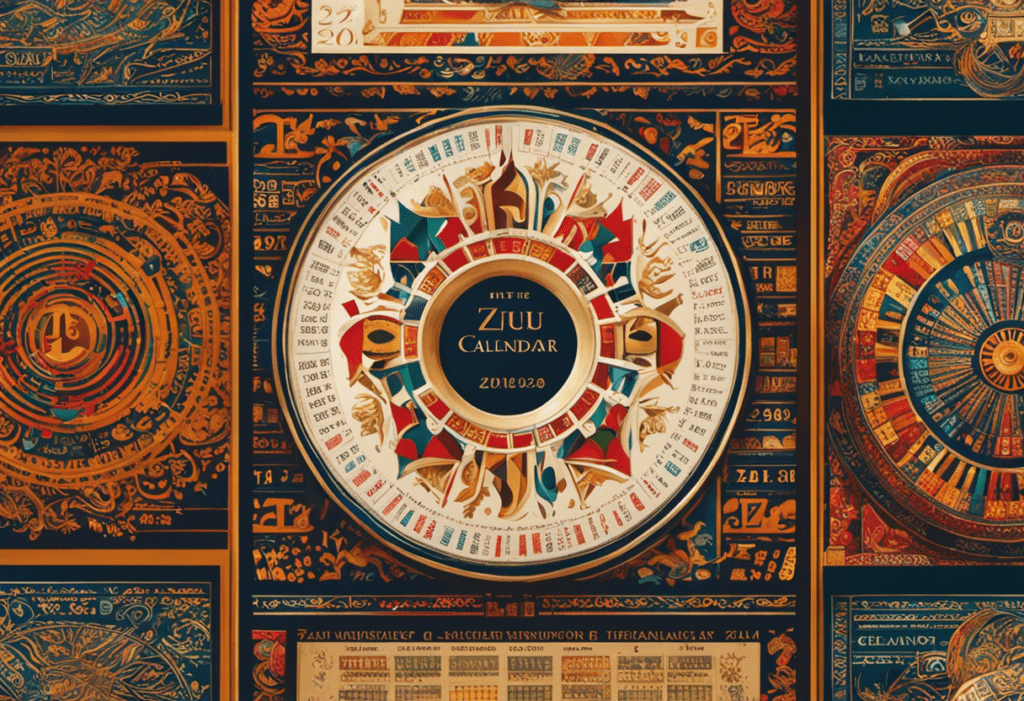In the rich tapestry of Zulu culture, the calendar is adorned with vibrant festivals and celebrations that symbolize the deep-rooted traditions and values of this esteemed community.
From the mesmerizing Royal Reed Dance Festival, where young maidens showcase their grace and beauty, to the spirited Shaka’s Day Celebration, honoring the legendary Zulu King, these events offer a glimpse into the cultural magnificence of the Zulu people.
Step into this world of enchantment and immerse yourself in the timeless traditions that define the Zulu calendar.
Key Takeaways
- The Royal Reed Dance Festival and Umhlanga Festival are annual events that showcase Zulu cultural traditions and promote unity, respect, and purity. They involve young women performing traditional dances and are held at Enyokeni Royal Palace in September.
- Shaka’s Day Celebration is a festival that honors the legacy of Zulu king, Shaka. It includes cultural performances, reenactments, and ceremonial rituals symbolizing respect. Commemorative gatherings are held at Shaka’s gravesite to celebrate Zulu history and cultural heritage.
- The Ukweshwama Ceremony and Festive Food celebration is dedicated to celebrating the first fruits of the harvest. It involves ritual slaughter, ceremonial dance, and community feasting to symbolize unity. The blessing of crops is also performed to ensure a bountiful harvest. Traditional dishes like isibhede and umphokoqo are enjoyed during this festival.
- The Zulu New Year and Community Celebrations mark the start of a new cycle and are celebrated with vibrant spirit and traditional attire. Lively dancing to the rhythmic beats of drums, along with intricately designed decorations and Zulu warrior shields, are part of the festivities. These celebrations also play an integral role in showcasing the rich cultural heritage of the Zulu people.
The Royal Reed Dance Festival
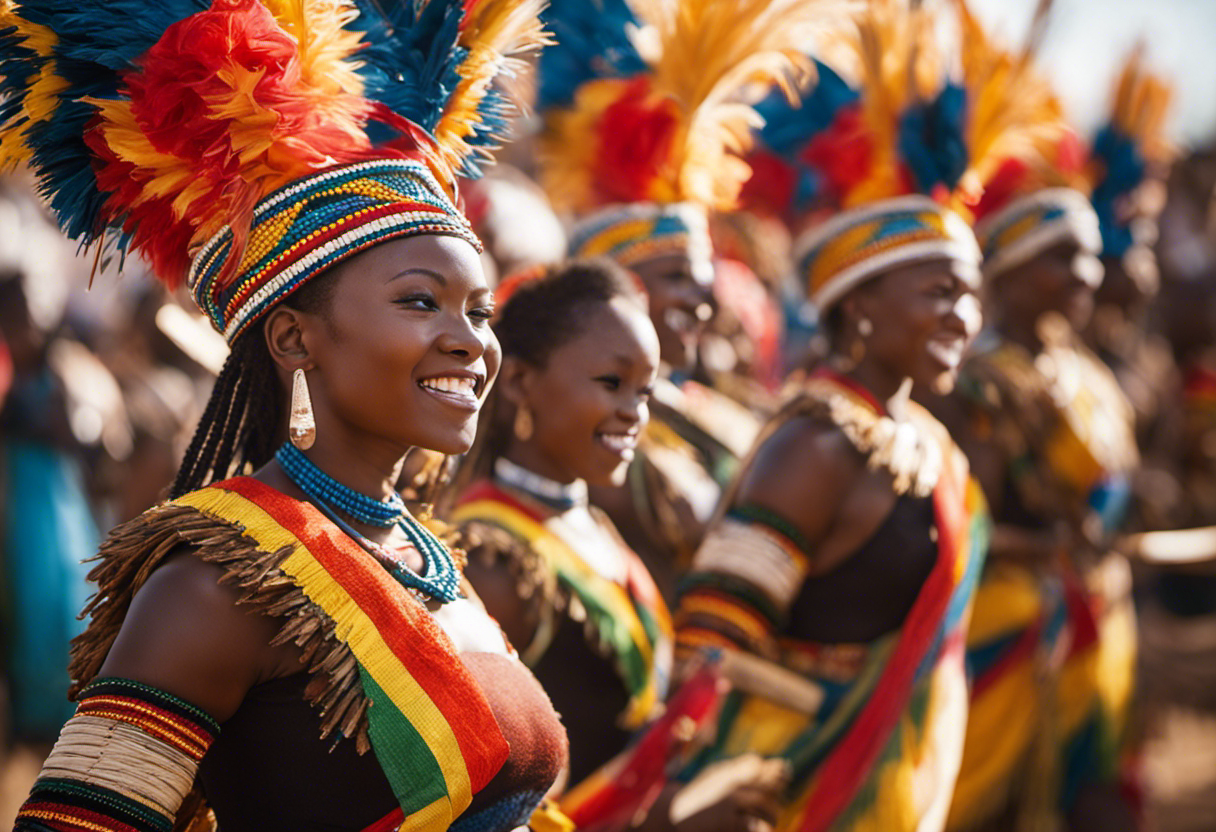

The Royal Reed Dance Festival is an annual event that takes place with unwavering frequency, showcasing the rich cultural traditions of the Zulu people. This festival, known as Umkhosi woMhlanga in the Zulu language, is one of the most important and highly anticipated traditional Zulu festivities. It is held in September at the Enyokeni Royal Palace in Nongoma, KwaZulu-Natal, South Africa.
The Royal Reed Dance Festival is a celebration of Zulu cultural heritage and serves as a rite of passage for young Zulu girls. During the festival, thousands of young women, known as maidens, gather to perform a traditional dance. The dance involves carrying long reeds and presenting them to the Zulu king and other dignitaries as a sign of purity and respect. The reeds are used to build or repair the king’s royal residence.
In addition to the dance, the festival also features various cultural activities such as music, poetry, and traditional rituals. It is a time for the Zulu community to come together, celebrate their heritage, and reinforce the values of unity, respect, and purity.
The Royal Reed Dance Festival is not only a significant cultural event but also a major tourist attraction. Visitors from around the world have the opportunity to witness and engage with Zulu traditions firsthand, gaining a deeper understanding and appreciation for the Zulu culture.
Shaka’s Day Celebration
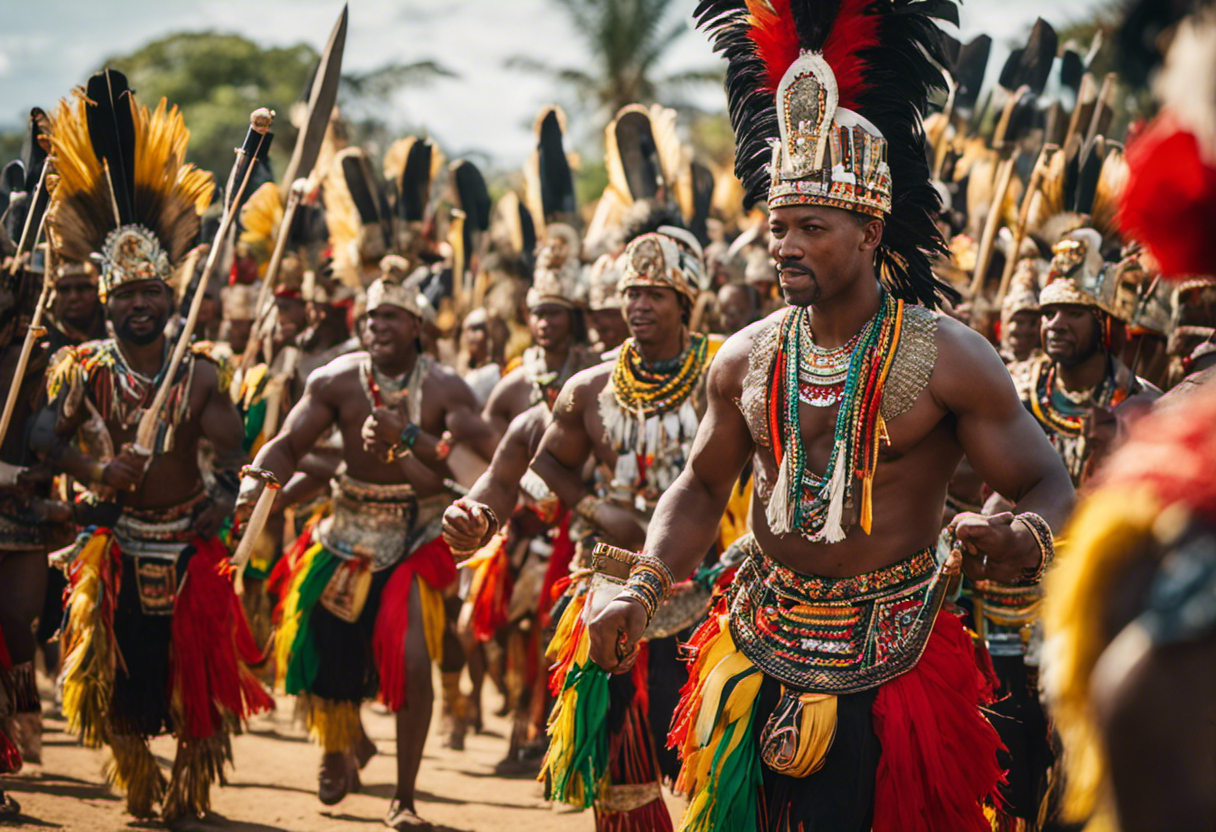

Celebrated throughout the Zulu kingdom, Shaka’s Day honors the legacy and contributions of the renowned Zulu king, Shaka. This annual celebration is a significant event in the Zulu calendar, commemorating the life of one of the most influential figures in Zulu history. Shaka’s Day is a time for the Zulu people to reflect on Shaka’s accomplishments and the impact he had on the Zulu nation.
Here are four key aspects of Shaka’s Day Celebration:
- Cultural Performances: The day is marked by vibrant cultural performances, including traditional dances and music. These performances showcase the rich Zulu heritage and pay tribute to Shaka’s legacy.
- Reenactments: The celebration often includes reenactments of significant events from Shaka’s life. These reenactments provide an opportunity for the younger generation to learn about Shaka’s leadership and the Zulu warrior traditions.
- Ceremonial Rituals: Various rituals are performed during Shaka’s Day Celebration, symbolizing respect and homage to the Zulu king. These rituals are aimed at preserving and passing on the cultural traditions associated with Shaka.
- Commemorative Gatherings: People gather at Shaka’s gravesite or other significant locations associated with him to pay their respects and offer prayers. These gatherings serve as a reminder of Shaka’s lasting impact and the reverence he holds in Zulu society.
Shaka’s Day Celebration is a time for the Zulu people to celebrate and honor their rich history and cultural heritage, ensuring that Shaka’s legacy lives on for generations to come.
Umhlanga Festival
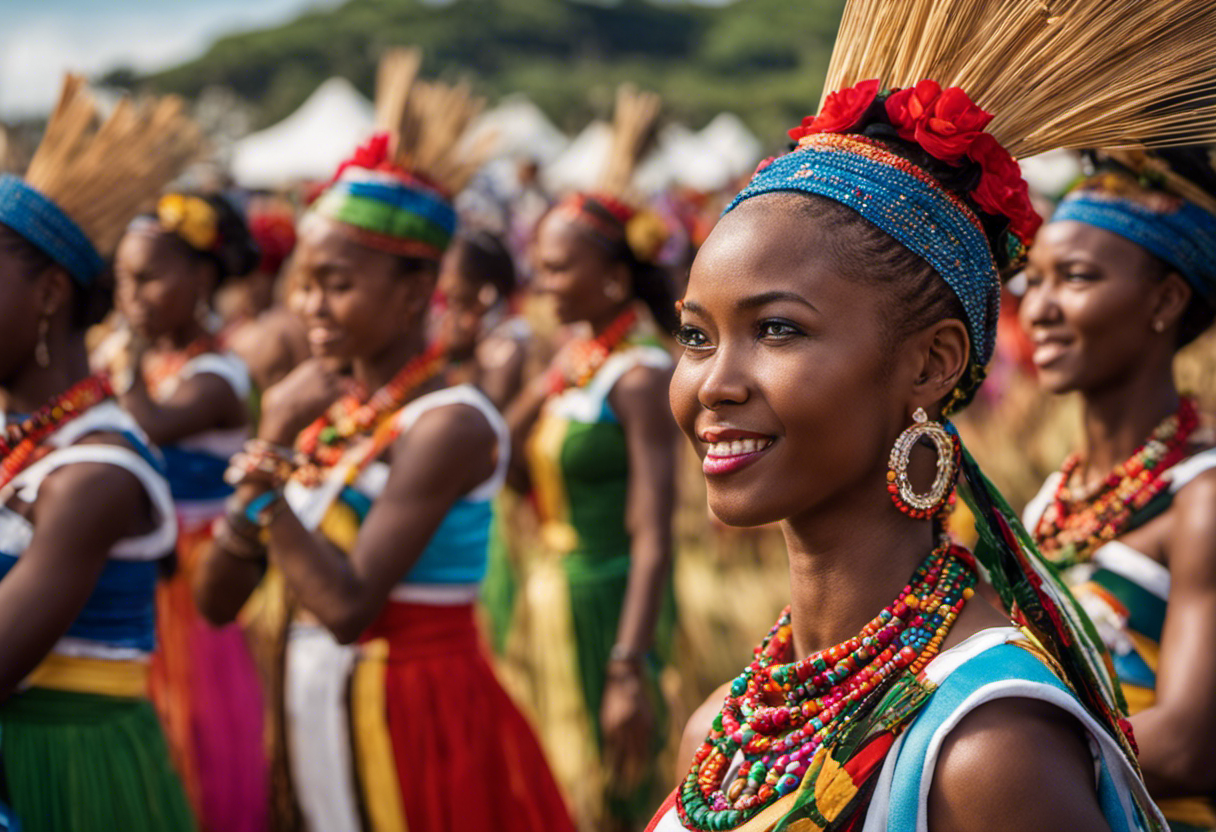

An integral part of the Zulu calendar, Umhlanga Festival is a vibrant and culturally significant event. Held annually in September, this festival is also known as the Reed Dance ceremony. The Umhlanga Festival is a celebration of purity, virginity, and the importance of young women in Zulu culture.
During the festival, thousands of young Zulu women gather at the Enyokeni Royal Palace in Nongoma, South Africa. They come dressed in brightly colored traditional attire, adorned with necklaces, bracelets, and beadwork. The highlight of the festival is the traditional dance performances, where the women showcase their agility and gracefulness. Accompanied by rhythmic drumming and singing, these dance performances are a visual spectacle that mesmerizes the audience.
The festival serves as a platform for young women to demonstrate their commitment to cultural values and traditions. It is also an opportunity for them to pay homage to the Zulu king and queen mother. The festival promotes social cohesion and unity among the Zulu community, as people from various regions come together to celebrate their heritage.
The Umhlanga Festival is not only a cultural event but also a symbol of empowerment for young Zulu women. It highlights their role in society and emphasizes the importance of preserving and passing on Zulu traditions to future generations.
Ukweshwama Ceremony
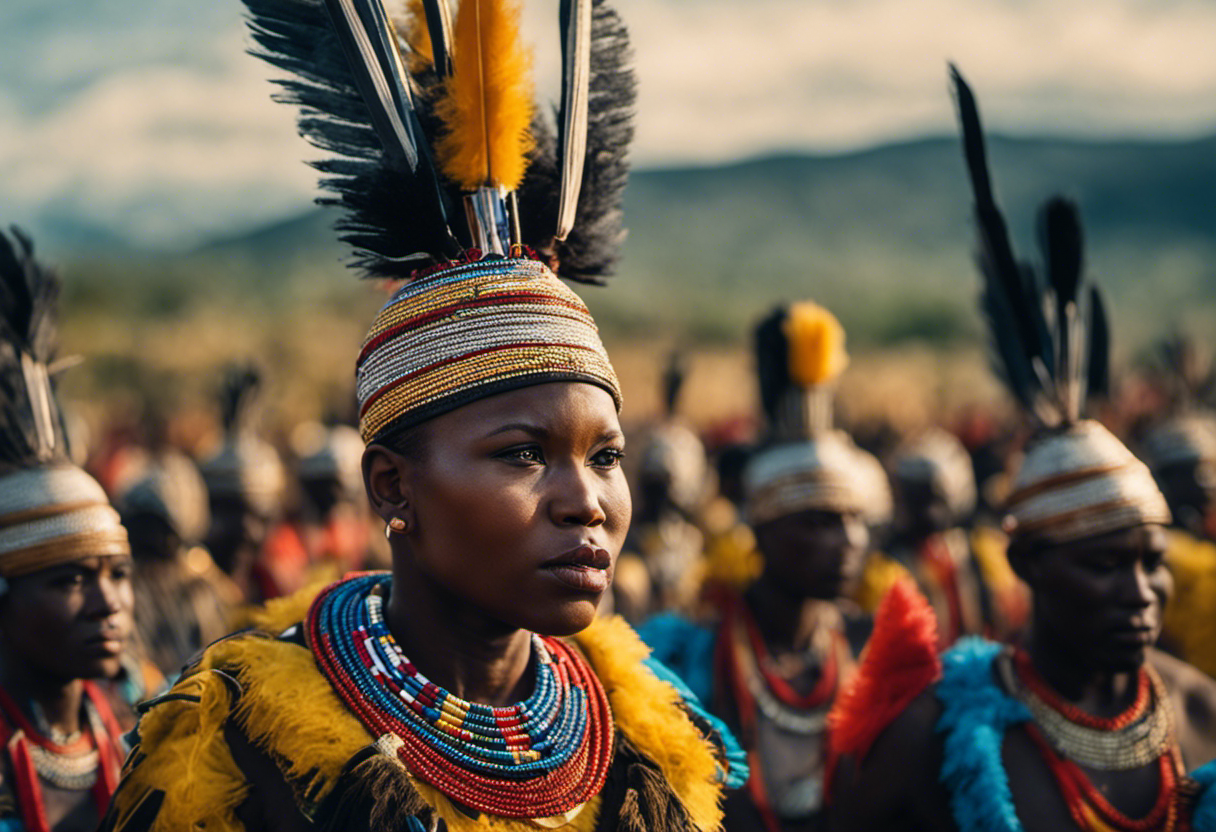

The Ukweshwama Ceremony holds great cultural importance in the Zulu calendar. This traditional event is a celebration of the first fruits of the harvest and serves as a way for the Zulu community to give thanks to the ancestral spirits for their blessings. The ceremony involves various ritual practices that are passed down through generations, reinforcing the cultural heritage of the Zulu people.
- Ritual slaughter: During the Ukweshwama Ceremony, a bull is chosen and slaughtered as a symbolic offering to the ancestors. This act represents the Zulu people’s appreciation for the abundance of food provided by the land.
- Ceremonial dance: The participants engage in a vibrant dance known as ‘ukusina’. This dance is performed to honor the ancestors and seek their continued protection and guidance.
- Community feasting: After the rituals and dances, the community comes together to share a feast. This communal meal symbolizes unity and gratitude for the blessings of the harvest.
- Blessing of crops: The ceremony also includes the sprinkling of sacred water on the fields to bless the upcoming planting season and ensure a bountiful harvest.
The Ukweshwama Ceremony not only strengthens the cultural identity of the Zulu people but also fosters a sense of community and gratitude for the land and its resources.
The Zulu New Year
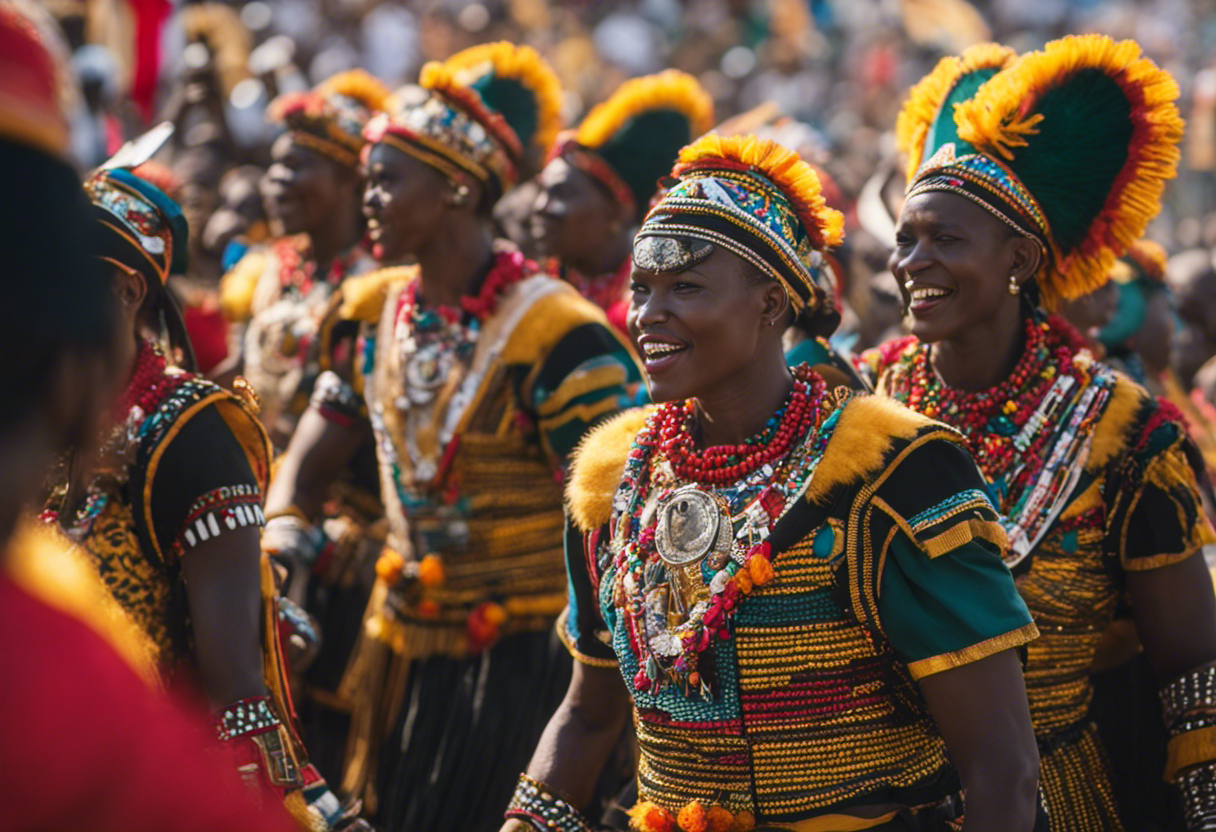

As the start of a new cycle, the Zulu New Year marks a time of reflection and anticipation for the Zulu community. The Zulu New Year, also known as uMkhosi Wokweshwama, holds great significance in Zulu culture. It is a time for the community to come together and celebrate their traditions and cultural practices.
Rituals and traditions play a central role in the Zulu New Year celebrations. The festivities begin with a cleansing ceremony, where participants purify themselves by bathing in a river or stream. This is followed by the slaughtering of a bull, symbolizing abundance and prosperity for the coming year. The meat is then shared among the community members, strengthening social bonds and promoting unity.
Community celebrations are an integral part of the Zulu New Year. The festivities include music, dance, and storytelling, showcasing the rich cultural heritage of the Zulu people. Traditional attire is worn during these celebrations, with men donning animal skins and women wearing brightly colored garments adorned with beads and intricate designs.
Festive food is an important aspect of the Zulu New Year celebrations. Traditional dishes such as isibhede and umphokoqo, made from maize meal, are prepared and shared among the community. These dishes represent the abundance of the harvest and are enjoyed by all.
Inanda Heritage Festival


The Inanda Heritage Festival holds great cultural significance in the Zulu community, as it celebrates the rich history and traditions of the Inanda region.
This festival showcases various traditional Zulu festivities, including music, dance, and storytelling, providing an opportunity for community members to come together and honor their heritage.
The festival promotes community involvement and participation, with locals actively participating in the planning and organizing of the event, ensuring its authenticity and cultural integrity.
Cultural Significance of Inanda
In exploring the Cultural Significance of Inanda, one cannot overlook the profound impact of the Inanda Heritage Festival. This annual event celebrates the rich cultural traditions and historical significance of the Inanda community. Here are four key aspects that highlight the festival’s importance:
- Preservation of Cultural Heritage: The festival provides a platform for the community to showcase and preserve their cultural traditions, including music, dance, food, and traditional attire. It plays a crucial role in passing down these customs to future generations.
- Community Unity: The festival brings together people from different backgrounds, fostering a sense of unity and solidarity within the Inanda community. It promotes mutual understanding and respect among individuals, strengthening social bonds.
- Economic Boost: The festival attracts visitors from near and far, stimulating the local economy. It provides opportunities for local artisans, vendors, and businesses to showcase and sell their products, contributing to the financial well-being of the community.
- Historical Education: The festival offers educational activities and exhibitions that highlight the historical significance of Inanda. It allows attendees to learn about the community’s past, including its role in the struggle against apartheid and the development of Zulu culture.
Traditional Zulu Festivities
One of the highlights in the Zulu calendar is the annual celebration of the Inanda Heritage Festival, a traditional Zulu festivity that showcases the rich cultural heritage of the Inanda community.
This festival is a vibrant and colorful event that brings together people from all walks of life to celebrate the Zulu culture.
Traditional music is one of the main attractions of the festival, with talented musicians showcasing their skills and entertaining the crowds with rhythmic beats and soulful melodies.
The festival also provides an opportunity for attendees to don traditional attire, which adds to the overall festive atmosphere. Participants can be seen wearing beautifully crafted garments, adorned with vibrant colors and intricate patterns, reflecting the unique Zulu aesthetic.
The Inanda Heritage Festival is a testament to the importance of preserving and promoting traditional Zulu customs and traditions.
Community Involvement and Participation
With active engagement from local residents and enthusiastic participation from various community groups, the Inanda Heritage Festival fosters a sense of unity and pride in preserving Zulu traditions. This annual event encourages community engagement and cultural immersion through a variety of activities and programs. Here are four ways the festival promotes community involvement:
- Workshops and Demonstrations: The festival offers workshops on traditional Zulu practices, such as beadwork, pottery, and dancing. These interactive sessions provide an opportunity for community members to learn and actively participate in preserving their cultural heritage.
- Community Performances: Local musicians, dancers, and storytellers showcase their talents during the festival. This platform allows community members to share their skills and traditions with the wider audience, promoting a sense of pride and appreciation for their cultural heritage.
- Community-led Initiatives: The festival encourages community-led initiatives that highlight the importance of preserving Zulu traditions. Local organizations and individuals actively participate in organizing and managing various aspects of the festival, fostering a sense of ownership and empowerment within the community.
- Cultural Exhibitions: The festival features exhibitions that showcase Zulu history, art, and artifacts. These displays provide an opportunity for community members to immerse themselves in their cultural heritage and educate others about the rich traditions of the Zulu people.
Umemulo Coming of Age Ceremony
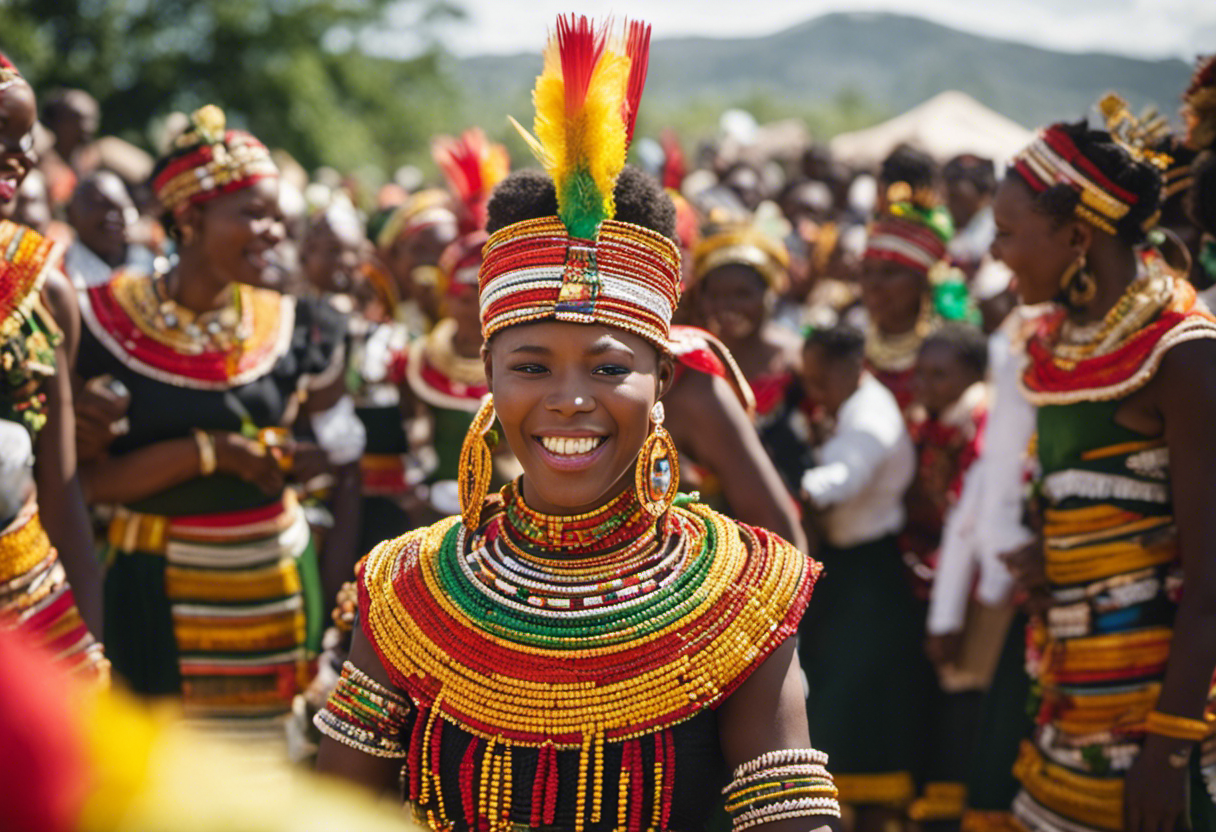

A significant aspect of the Umemulo Coming of Age Ceremony is the emphasis on cultural traditions and customs. Umemulo is a traditional Zulu ceremony that marks the transition of young girls into womanhood. This ceremony holds great significance in Zulu culture and is celebrated with great joy and enthusiasm.
Umemulo is a carefully planned event that involves various rituals and practices that have been passed down through generations. The traditions associated with Umemulo are aimed at instilling cultural values, teaching responsibility, and preparing young girls for their future roles as wives and mothers.
During the Umemulo ceremony, the young girls wear traditional attire and adorn themselves with beads and traditional accessories. They undergo a series of rituals and undergo a symbolic purification process. The girls also receive gifts from family and friends, symbolizing their transition into womanhood and their readiness for marriage.
The significance of Umemulo lies in its ability to preserve and promote Zulu culture and traditions. It serves as a platform for passing on the wisdom and knowledge of older generations to the younger ones. The ceremony also strengthens family ties and community bonds as it brings together family members, friends, and well-wishers to celebrate this important milestone in a young girl’s life.
Conclusion
In conclusion, festivals and celebrations in the Zulu calendar play a significant role in preserving the culture and heritage of the Zulu people.
These events provide opportunities for communal bonding, showcasing traditional practices, and passing down ancestral knowledge to younger generations.
One interesting statistic is that the Umhlanga Festival, also known as the Reed Dance, attracts thousands of young Zulu maidens who present reeds to the Zulu king, highlighting the importance of female empowerment and the preservation of cultural traditions.

